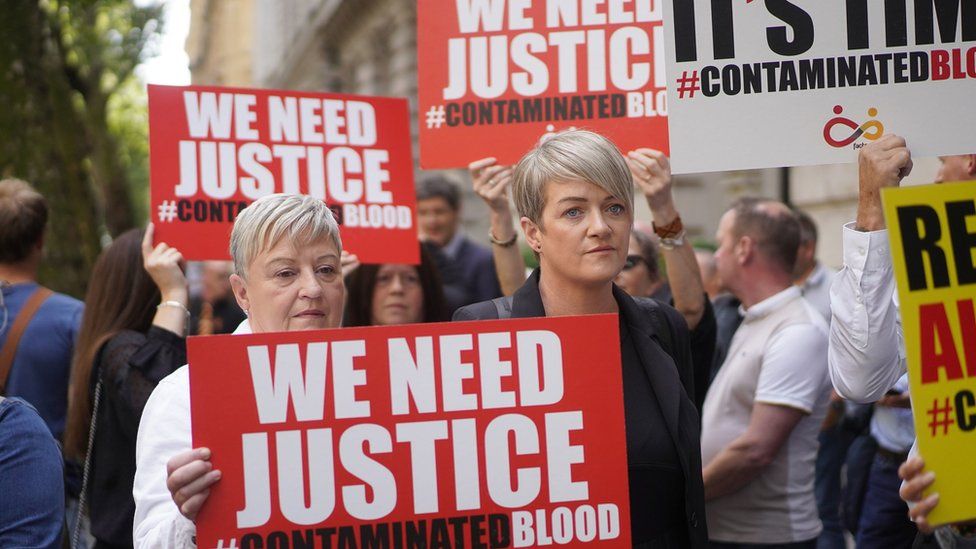Ministers lose infected blood vote after Tory MPs revolt
- Published

Campaigners for a compensation scheme gathered in London earlier this year
MPs have backed a move to speed up compensation for victims of the NHS infected blood scandal, delivering the prime minister his first Commons defeat.
Ministers will now have to set up a body to run the scheme within three months of a new bill becoming law.
The vote was passed by 246 votes to 242 after 22 Conservatives rebelled.
The Haemophilia Society said Rishi Sunak "should be ashamed" he had been forced "to do the right thing".
The society's chairman Clive Smith said it was an "incredibly emotional" moment for campaigners.
"Parliament last night drew a line in the sand and said: no more, no longer, will you need to fight, no longer will you need to wait, justice will finally be delivered to those who've waited for so long," he told BBC Radio 4's Today programme.
The vote - an amendment to the Victims and Prisoners Bill - was the government's first defeat in the Commons on a whipped vote since the general election in 2019.
The legislation now needs to be approved by the House of Lords before becoming law.
The government has said there is a moral case for compensating victims of the scandal, and has made the first interim payments of £100,000 each to 4,000 surviving victims and bereaved partners.
However, it said it wanted to wait for the infected blood inquiry to conclude before setting up a full scheme.
Earlier this year, Sir Brian Langstaff, who is chairing the inquiry, called for a full compensation scheme to be set up immediately. He also said it should be widened to include orphaned children and parents who lost children.
Throughout the 1970s and 1980s, up to 30,000 people were given contaminated blood products.
More than 3,000 people died after contracting HIV or hepatitis C after receiving a blood transfusion on the NHS or a treatment made from contaminated blood.
Campaigners say the speed compensation is administered is key. It has been estimated that one person affected by the scandal dies every four days.
Justine Gordon-Smith had to put her career on hold to care for her father
Justine Gordon-Smith, whose dad died after being given infected blood, told BBC Newsnight she was "stunned" by the result but was concerned what the government "might try to do to limit things now".
Her father Randolph Peter Gordon-Smith, who had haemophilia, learned in 1994 that he had been infected with hepatitis C. He later died in 2018.
"When he was infected - he lost everything," she said. "He lost his home, his job, his wife, his health - everything - and he became a recluse."
She said compensation was not just about recognition, but "repairing the damage that's done to your life".
"The huge hole, the entire career, everything that our dad lost - that's the big issue. Then there's all the time and years of life we've lost," she added.
Sir Brian's inquiry had been due to publish a final report in November, but this has been pushed back to March 2024.
In an attempt to speed up efforts to compensate victims, Dame Diana Johnson - who leads the All-Party Parliamentary group on Haemophilia and Contaminated Blood - put forward the amendment.
She told MPs that Sir Brian had already made clear his inquiry's recommendations on compensation and that the government did not need to wait for his final conclusions before setting up a scheme.
The Kingston Upon Hull North MP also noted that victims of the Post Office Horizon scandal had been awarded compensation before the inquiry's final report had been published, and argued the same should apply to those affected by infected blood.
Her amendment was backed by her own party, with shadow minister Kevin Brennan saying there was "no reason for the government not to move forward on this issue".
Conservative MP Rehman Chishti was among those who gave his support, saying: "Justice delayed is justice denied - we should not delay any further."
The voting list showed Mr Chishti was joined by a number of former Tory ministers, including Sir Robert Buckland, Damian Green, Dame Andrea Jenkyns and Chloe Smith.
The defeat came despite a last-ditch attempt by the government to offer concessions in an attempt to placate MPs.
Justice Minister Edward Argar had said the government would try to amend the bill in the Lords to clarify when the body to provide compensation to infected blood victims would be delivered.
Andrew Evans, chairman of Tainted Blood, a campaign group which represents contaminated blood victims, said the government had promised "a future amendment to buy off Tory MPs, a move which thankfully has failed".
Mr Evans said any attempts to reverse the amendment when the bill goes to the Lords "would heap yet more misery on those who have already suffered so much for four decades".
Related Topics
- Published1 day ago
- Published6 October 2022